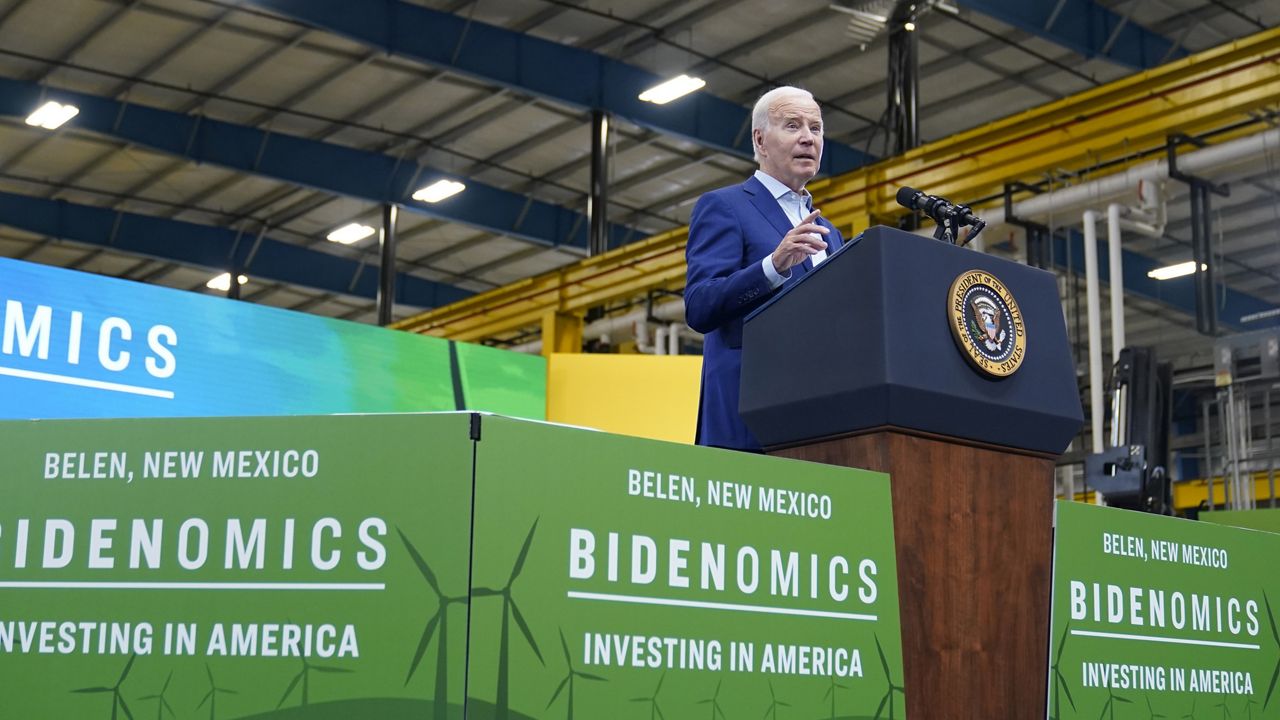President Joe Biden continued his western state swing to sell his economic agenda, speaking at a groundbreaking ceremony for a wind tower manufacturing facility in New Mexico on Wednesday and asserting America will be the “leading manufacturer in the world.”
The facility is set to create 250 jobs in the state, according to the White House.
Biden made the case that his economic agenda has seen a boom in domestic manufacturing jobs, thanks in part to a triumvirate of legislative successes: the Bipartisan Infrastructure Law, the Inflation Reduction Act and the CHIPS and Science Act, which the president signed into law one year ago on Wednesday.
“[We] went through an awful long time watching companies in the last 15 years decide to invest overseas because labor is cheaper -- shutting down factories all across America,” Biden said.
“I asked myself,” he continued, “why do I have to put up with that? We’re sending jobs abroad and importing products at home. We knew we could change it. I just knew we could change it.”
The CHIPS law is a roughly $280 billion measure aimed at expanding domestic semiconductor production, expanding research and development capacity and strengthening supply chains in an effort to compete with China. It’s a key pillar of the president’s “Bidenomics” push.
“American invented these chips,” the president said on Wednesday. “But over time, we went from producing nearly 40% of those chips, the world's chips, down to 10%. That's why I designated and I signed and I insisted that it be written and passed the Chips and Science Act exactly almost one year ago today.”
The White House on Wednesday touted that companies have announced more than $166 billion in domestic semiconductor manufacturing investments since the measure was signed into law – ranging from Micron’s $100 billion investment in Central New York to Intel’s $20 billion semiconductor plant in Ohio – and Commerce Secretary Gina Raimondo announced that her department has received 460 proposals across 42 states from companies looking to manufacture semiconductors in the United States.
“And guess what? Average Salary is about 130,000 grand,” Biden said on Wednesday. “And guess what? You don't need a college degree.”
Ahead of the event, Biden, an advocate for expanding access to community college, noted at least 50 community colleges have announced programs in the last year to help American workers access good-paying jobs in the semiconductor industry.
Biden’s remarks were against the backdrop of a groundbreaking for wind tower manufacturing plant Arcosa. The facility previously housed a Solo Cup factory that shut down in 2008, which cut 200 jobs, and later served as a plastics plant that shuttered in 2020, laying off roughly 100 workers.
During his speech, the president noted that a few years ago, the company was laying off workers “because we weren’t investing in them.”
“They’re now poised to be the leader in the wind industry,” he declared.
“I mean this in sort of a bottom line: we decided we're going to invest in America,” Biden said, hitting his hand on the podium for emphasis.
Acrosa, the White House said, has received $1.1 billion in wind tower orders since the Inflation Reduction Act – Democrats’ clean energy, health care and tax reform package – was signed into law last year, which is allowing the company to expand and hire new workers.
“Hundreds of actions coordinated through his entire government are sparking a manufacturing renaissance across the United States,” White House climate adviser Ali Zaidi told reporters ahead of the speech.
Biden is working to sell his economic proposals in the face of polling suggesting some public skepticism, despite slowing inflation and record-low unemployment.
The president does have a case to make to the public on employment. As the U.S. economy healed from the coronavirus pandemic, hiring has surged at factories. Manufacturing jobs have climbed to their highest totals in nearly 15 years. This is the first time since the 1970s that manufacturing employment has fully recovered from a recession.
But the pace of job growth at manufacturers has slowed over the past year. Factories were adding roughly 500,000 workers annually last summer, a figure that in the government's most recent jobs report fell to 125,000 gains over the past 12 months.
Biden administration officials have said there are more factory jobs coming because of its infrastructure spending, investments in computer chip plants and the various incentives in the Inflation Reduction Act.
Their argument is that the incentives encouraged the private sector to invest, leading to $500 billion worth of commitments to make computer chips, electric vehicles, advanced batteries, clean energy technologies and medical goods. They say that more factories are coming because, after adjusting for inflation, spending on factory construction has climbed almost 100% since the end of 2021.
In April, the Economic Innovation Group, a public policy organization, issued a report that called construction spending for factories a “nationwide boom.” The report notes there are signs that manufacturing gains are most prominent outside the Midwest, which has historically identified with the sector, as more plants open in southern and western states. But EIG is less sure that a full-fledged restoration of manufacturing is in the works as the sector has been in decline for decades.
Labor Department figures show that total factory employment peaked in 1979 at nearly 19.6 million jobs. With just under 13 million manufacturing jobs now, the U.S. is unlikely to return to that level because of automation and trade.
The Associated Press contributed to this report.



